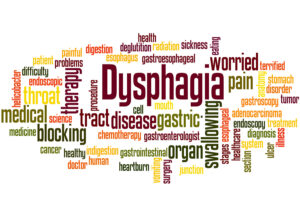Avoiding Dysphagia for Adults with CP

Cerebral palsy comes with all sorts of potential issues, including trouble swallowing, which is known medically as dysphagia. Dealing with dysphagia is a lot easier for your family member if she has the help of home care providers who know what to do.
Symptoms of Dysphagia
Dysphagia can appear in a variety of symptoms. Your family member might cough while she’s eating or right afterward. This is a sign that her body is having trouble swallowing. Food or beverages might also seem to get stuck in her mouth. She might avoid eating or drinking, which can lead to weight loss or even dehydration. Dysphagia is embarrassing for many people with CP, so it can be helpful to have home care providers available who know how to help her cope.
Check Food Fluidity and Consistency
For some people with cerebral palsy, food and beverages can be the wrong consistency. Thickening or thinning foods and beverages can help to make them easier for her to swallow. Home care providers can double check that the consistency is correct for your family member, which makes eating and drinking so much easier for her.
Take Plenty of Time for Meals
Meal timing can make a big difference, too. If your family member feels rushed too often, she might try to rush herself through eating and drinking. Being in a hurry can cause her throat and mouth muscles to have even more difficulty working to help her swallow. When your family member has plenty of time to eat, she’s able to do so in a much more relaxed environment and that helps immensely.
Use Tips from Her Doctor or Therapist
Your family member’s doctor or physical therapist can offer some helpful tips that can make dysphagia less of an issue for her. Some of those tips might involve adjusting placement of her chin or trying specific exercises that can help improve coordination when it comes to swallowing. Home care providers who help people with cerebral palsy are usually familiar with these types of tips and they can help to prompt your family member so that she’s able to use these tips to her best advantage.
Home care for cerebral palsy is an integral part of helping your family member manage dysphagia and other complications from CP. They can spot potential problems before they interfere with your family member’s comfort and ability to enjoy her life to the fullest extent possible.
If you are considering therapy programs in Avon, IN, please call the caring staff at RSI Cares. Serving Greater Indianapolis Area. Call for Immediate Info & Assistance: 317-471-0750.
- NOTICE: Indiana Direct Service Workforce Investment Grant - January 30, 2023
- Take a Break and Let Respite Care Aides Help Out - November 10, 2021
- Let Residential Habilitation Services Bring Independence to Your Child With Down Syndrome - October 20, 2021
